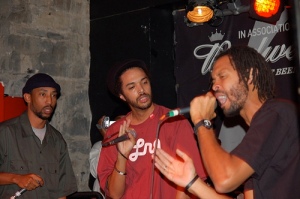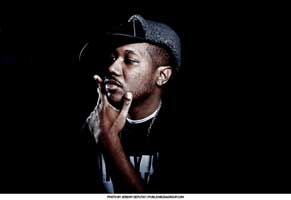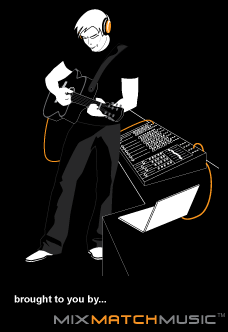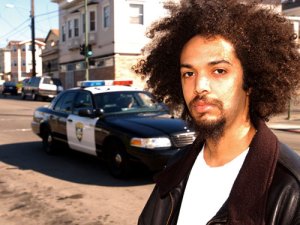
Opio of Souls of Mischief
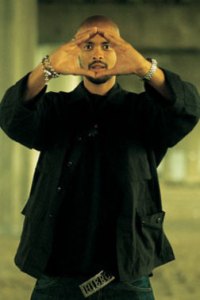
Tajai of Souls of Mischief
Since the early 1990s, Oakland, California based Hip-Hop collective Hieroglyphics has taken on many shapes and sounds, from the lyrically complex and dense solo stylings of Del tha Funkee Homosapien to the rapid-fire and diverse delivery of Hieroglyphics to the smooth and masterful underground sound of Souls of Mischief. Spanning nearly two decades, Hiero and Souls of Mischief have brought new sounds and ideas to the industry while also providing a backbone of creativity that has helped influence the entire Bay Area music scene.
In November I had the opportunity to sit down with Tajai and Opio of Hiero and SOM, two members responsible for an incredible amount of solo and collaborative work for the HieroImperium. In part 1, we discussed their musical backgrounds, the formation of Hiero and the difficulty of staying relevant in a music industry that places an emphasis on the “next big thing.”
ACtual: Starting off early, what were both of your initial musical influences and inspirations, and when did you decide that rapping is what you wanted to do?
Opio: I used to be hella into Reggae, really. Yellowman is one of my favorites, obviously Bob Marley, Peter Tosh, they had the swagger that got me on rap. My parents were really into music, so through them I heard Earth, Wind and Fire, Parliament-Funkadelic, stuff like that. When I first really started to hear rap, I heard “Rapper’s Delight,” stuff like that, Grandmaster Flash. They used to play Rock and Roll stations out here, mixing, like college radio. Really the first time I heard “Rapper’s Delight,” I was just hooked to the way he was spittin’, it was cool, and it just evolved from there. All the older cats in my neighborhood were listening to them, breakdancing, graffiti and all of that was a part of it too. At the same time cats were breaking, graffiti artists, so it was that whole Hip-Hop culture, it wasn’t only just the rapping, I was breakdancing, all of that.
Tajai: Funk, I would say Funk was my biggest influence. Parliament, Bootsy, George Clinton, and then Too Short is probably the main reason I rap just because all the other rappers, I saw other people doing it, but I didn’t think that people from here could do it. As a kid, it was just my perception of it was something that other people did until I saw Too Short rapping and then I was like, “He’s from here and he raps.” That’s when I really started seriously rapping.
AC: You two as well as the Souls of Mischief crew met early on. Talk about how all of you met, came together and the creation of both Souls and Hieroglyphics.
T: We grew up in the same area, so I’ve known Casual and A-Plus since like Kindergarten, 1st grade. Del was at the same school as us, we just sort of all had a mutual interest in Hip-Hop, so once Del got on in ’91 he sort of brought us into the industry, but we had been rapping together for a long time before that. Casual went to junior high with Op.
O: The first time I went into the studio ever, me and Casual rented a studio in the 8th grade. Our man Terai came with us, he was in the 7th grade. I wasn’t even rapping then, I was a DJ, so I was DJing, scratching during that time. This is in the 7th/8th grade, me and Casual went to junior high and he already knew them. I would listen to their music when I was in junior high but I hadn’t really started to kick it with Tajai and A-Plus, but he would have tapes and be like, “listen to my partners.” I’d see them up the block and be like, “there goes Tajai right there.” We really started hanging out in high school, but the whole time we lived right around the same area. We all lived around the same block as each other but we weren’t really in communication until high school, and that’s when we really became a lot more serious about the rapping.
AC: You were released on Jive Records in 1993. Talk about the process of creating that album and what working for a major label was like. You were what, 17, 18 when that album came out?
O: Yea. That album to me was something, that, I would listen to songs that they had done when I was in junior high and me and Casual went into the studio, we were kinda serious about the whole rap thing. Tajai and A-Plus were working with Sir Jinks and they had a professional sound that inspired us to get on our business a little more. This is early on, so we had been working on our craft until we came out. We were probably 13, 14 really serious going to the studio.
That album, even though we recorded it in 2 weeks, it was something that was formulating for a lot of years. I really think it was highly influenced also by the whole crew aspect, not just the fact that we were Souls of Mischief, because we’re competitive by nature within Souls of Mischief, but then there was also Del and Casual, Pep Love, we had these other fierce MCs. Even during the time before ’93 til Infinity came out, everybody heard the demos, so we had something to live up to. People would hear the demos and be like, “the album will be wack, whatever,” and they heard other cats around us that were really shining, so it was a long time coming to me, that album getting done, even though it seemed like it popped out of nowhere, we had been working for some years.
AC: When Hiero formed, what was your original vision for the group and how did you go about making Third Eye Vision?
T: We’ve been together as a crew since before Del’s first record. Our vision then was let’s just all be the best we can be, get signed and be super stars. That’s different than how things progressed just dealing with major label politics, and the fact that, for someone to walk into Hip-Hop today, they have no idea that even when we came out it was still like a sub-culture. So being a super-star and blowing up meant selling a couple of thousand records, maybe going gold, but not platinum. The only people going platinum were guys like Vanilla Ice, MC Hammer.
So once we got off the majors, it was like let’s not stop making music just because we don’t have a label, let’s keep making music and then Domino was like, “Shoot, we might as well put this record out instead of trying to shop it, and from there we started Hiero Imperium and we’ve been rolling since then because it’s been, I’m not going to say easier logistically, but easier in regard to being able to be agile and creative. And now, almost 10, 11 years later, we’re really reaping the rewards of having laid that groundwork of being independent so long. Third Eye was something we recorded out of the need to make music, and then from there it built up to this independent label.
AC: With HieroImperium, you guys have been putting out albums and podcasts for a while now. What do you find to be the hardest part of being in this industry for as long as you guys have?
T: We’re not new, that’s the problem. To people who have never heard of us, which is not that many people, it’s like, “Wow these guys are fantastic!” But to people who have, it’s like, we come with something we feel is our best work and it’s like, “Ok, that’s dope.” There’s so much garbage out here that gets attention because it’s new, and that’s the frustrating part about it. If you’re consistent in music, that’s not good enough a lot of times, you have to have controversy or you have to fall real low to bring yourself back up, but we’ve been consistent and there’s so many of us, that that’s the biggest problem I see, we’re not new.
O: Also, over the years of doing it, touring, consistently going out and being on the road, not just only recording the albums, but the whole rap life in and of itself can take its toll. Sometimes people get jaded, but I think that luckily because there’s a lot of us, we’re able to keep ourselves focused and sharp. Without other people pushing you, and you’re hearing people recording songs and maintaining that creative energy and you don’t have it, your brother can lift you up a little bit and you hear some new shit, “oh man that’s dope,” it kinda gets your juices flowing. Maybe you’re at the house just bored, you wrote so many raps you’re through with it for a hot second, so it’s always a good thing to have other cats around you working and doing stuff. Casual, he’s always busy, Del is always in the lab working, A-Plus just consistent with the beats, so you can always go to those guys and be like, “What’s new?” just to get a little spark.
AC: In terms of approaching the writing, how would you say that your styles differ when you’re trying to come up with stuff for an individual album vs. working on a Souls project or working on a Hieroglyphics project, how do you approach each of those differently?
T: You’re competing against yourself when you’re making a solo record, so you get to look at things more holistically, you look at the entire project as a whole and where things fit in. Whereas when you’re in a group, you’re looking at how you fit into that particular song. With your own records I think it’s harder because you have to push yourself a little bit harder to be better than yourself, verse by verse and song by song. With a group album I think it’s easier because there’s so many other people you’re competing against that you have to come with your best work, that’s the main difference for me.
O: To me, I just feel more comfortable in the group element whether it’s Souls of Mischief or Hieroglyphics, I like the collaboration aspect of things and working with other cats, so to me that’s always been fun. I saw the challenge more so than doing music with others, trying to do something by myself like it’s a Herculean task cause you have so much more that you have to do. At the same time, once the process gets going, you kinda relax in your environment and it’s a good place to be because you can advance your style a little more. You get to go longer.
Especially in Souls of Mischief, we try to keep that quick jab approach so for me it’s kinda fun to just run my mouth for a little while. I’ve always been trying to explore more avant-garde styles whenever we’re doing songs with Souls of Mischief, so you can see the different elements that we bring to the table when you see our solo projects. You can see the different parts working. Sometimes it’s hard to tell what it’s like when you’re listening to the group all together then you get to hear the solo and be like, “So that’s how Souls of Mischief comes together,” at least for me because I’m a fan of Souls of Mischief too, even though I’m in the group, when I’m with other cats I love to hear the music and I like to hear the solo albums as well to see them even go further with it.
AC: Going off what you were saying earlier about the hardest thing is having been here for so long because new stuff always gets more attention. You hear a lot of mainstream writers, media people that say Hip-Hop is dead, and rappers will sometimes say that too. But there’s a lot of really good Hip-Hop out there if you know where to find it, so what do you listen to and what other artists in the genre inspire you?
T: Percy P, Guilty Simpson, Madlib, Black Milk. There’s a lot of groups that you probably won’t hear anywhere but satellite radio. I like Lil Wayne because he’s pushing the boundaries of mainstream but he’s doing something wild and crazy to something that just listened to dance rap so that’s good because maybe their minds will open a little more to people who dwell completely outside of that, but ain’t really much on TV that I like, not because it’s on TV, but because Rap music is really Pop music now. Hip-Hop can’t ever be dead. It may not inspire you the way that it used to, but that’s probably because you’re just not into it anymore. But as far as Hip-Hop, when we do shows and there’s thousands of kids there, it’s like, what are they talking about?
O: The way that Hip-Hop has been brought to the table and how it’s shown, it’s really not the true artform of it. It doesn’t represent. It’s more for trying to sell products, clothes, alcohol, stuff like that. It’s like a big commercial. But when there’s true artists trying to explore the creative process and what it takes to make a great song or a great lyric, a guy like J Electronica for instance is really dope. There’s people out there that’s doing it, but when you watch Rap City, you don’t get to see those guys that often.
I just feel like the vehicle that people are going to start getting Hip-Hop with is going to open the doors for more creative styles, people that are pushing the envelope stylistically and creatively which for me is the essence of Hip-Hop. How it was when De La Soul was coming out and A Tribe Called Quest was coming out, new flavors. I feel like that old form of commercialized, over-commercialized Hip-Hop, that is dead. It’s old hat, you can only use that so much before people get numb to it and it becomes a hard sell, pouring champagne everywhere, throwing money everywhere, people have seen that so much it doesn’t sell shoes how it used to, so now they’re going to start looking to the underground to do that.
AC: We were talking earlier about your latest project, Vulture’s Wisdom, Vol. 1. Talk about your vision for the trilogy, when the other albums are going to come out and what the idea behind these solo albums is.
O: I was just working with my man Architect, I’ve always been a fan of his music and his beats for a long time. He’s always been a cat that was out there, the style of his music is something that I always had a good time and enjoyed listening to. He worked next to us at High Street studios, he had a spot next to me so we had more of a chance to kick it and hang out and we were talking about doing a record, but it never really came together. Eventually I saw him in traffic one time and he was like, “I’ve got some beats, I’ve been thinking about you, we should do an album together.” When he hit me some of the beats and the style he was working with, it was perfect, we were right on the same page at the same exact time, so from there we just started collaborating and made a lot of music. Then we decided that we should not really stop at just one thing but hit cats with at least three projects, so that’s how the whole idea for the trilogy came up. The concept behind the title, like we were talking about earlier how everyone says Hip-Hop is dead, there’s nothing there, it’s over with whatever, we were like, “Nah, we can eat here, it’s still a viable option for us,” so that’s how the Vulture’s Wisdom title came into play.
We just are really trying to kill the backstory in terms of that being the forefront, we want to make the music the forefront, the style, the beats, the rhymes, the lyrics, not really like this guy did this, that, and the other. There’s always the story and sometimes it’s more interesting than the music and then you hear the music and you’re like, “this is what all the hoopla is about?” We want to bring it back to where the music is what people care about more so than the imagery. I feel like the 90s are something that people are trying to reach for right now, like that’s the golden ear, which for me is ’88, but other cats are more caught up in that ’93 era right now, always reaching back to the 90s and trying to bring it forward to here. Whereas I’ve always been a part of that connected to the whole essence of real Hip-Hop, so that’s where I come from, that’s my pedigree, whereas other cats might be trying to bring that back, I’m just trying to stay in that vein that I’ve always been in, that true essence of Hip-Hop, so it’s not a stretch for me to come and do something that people might call “real Hip-Hop,” that’s what we do, that’s Hieroglyphics, some of that good shit.
AC: Tajai – Stanford Anthropology grad, is that right?
T: Yea.
AC: How do you feel that education, that degree has helped your music? Have you incorporated that in your career at all?
T: It’s helped me with research, but that’s about it. School is school, it’s different from music, it just helped me research topics. Aside from that, it maybe helped me be organized in terms of my business, just going to school in general, but that’s about it.
AC: How important is it to you guys that you’re not major label? Do you think that you would have gotten anywhere near what you have accomplished if you were working for a major?
T: You’re just at the mercy of the market. There’s artists like J*Davey, Bilal, artists that you’ll never see their record. They’ve been in the industry now for almost a decade but because it doesn’t fit the labels idea of what records are supposed to be, it never comes out, so in that respect we probably would never have been able to bust the moves we could. It’s still different, it’s not like you’re doing it for a more noble purpose when you’re independent or you’re major. The way it is now, we’re like a major independent, us, DefJux, Rhymesayers, probably Stones Throw are labels where people want to get on the label, so it’s like they’re treating our independent record label like we would treat a major as a signed artist. We have more control, but really the market determines a lot of it and it’s harder right now to not be seen as generic in this marketplace because there’s so much. I mean, I think there’s more musicians than fans almost, especially rappers. So it’s hard to distinguish yourself as far as “into the marketplace,” so in that respect, it might even be better to be on a major label where they have the money to market you, where you have a shoe and a commercial and an appearance on Entourage and all these different things that are going to give you more exposure. Like when we put out a record, when we put out Vulture’s Wisdom, it has 8 videos, and how many of those are going to be on TV? We send them to TV, but do they end up on TV? No. So it’s really like we’re relegated to YouTube and MySpace and satellite radio and internet radio, and that’s the downside of being independent. It’s more a matter of exposure and it’s a double-edged sword. They’ll spend the money to expose you, but if they don’t like what they hear, they’re not going to expose you at all and you might never see the light of day.
O: If you’re doing it in terms of a business endeavor, you have to take advantage of what’s out there. I feel like for Souls of Mischief at the time, how the market was, us going major label was the best way for us to go at the time. To try to go independent would have been a bad look. It gave us a really good opportunity to get our music out there. We made what we really wanted and it got out to the people. For a time, the labels were all about trying to make super Pop Hip-Hop and I don’t know if they were going towards super avant-garde now, but definitely the tide has changed in terms of which artists are selling records. Lupe Fiasco is outselling artists, he’s like top-tier in terms of who the guy is. Kanye West outselling 50 Cent, so there’s a changing of the guard where if you are really more on the creative side of things, you might be able to get in and bust some moves, if you’ve got what it takes. Some people don’t necessarily have that appeal so it might be bad for them to go the independent route, you gotta really weigh your options. Cause the main thing, what you want to do is get your music out there for people to see you and listen to you and at the end of the day, to me that’s the most important thing. Then you can do whatever you gotta do with your hustle.
Check back with Evolving Music on Friday for part 2 where we discuss the future plans of the group, their thoughts on the remix culture and their favorite Hip-Hop albums of all time.
